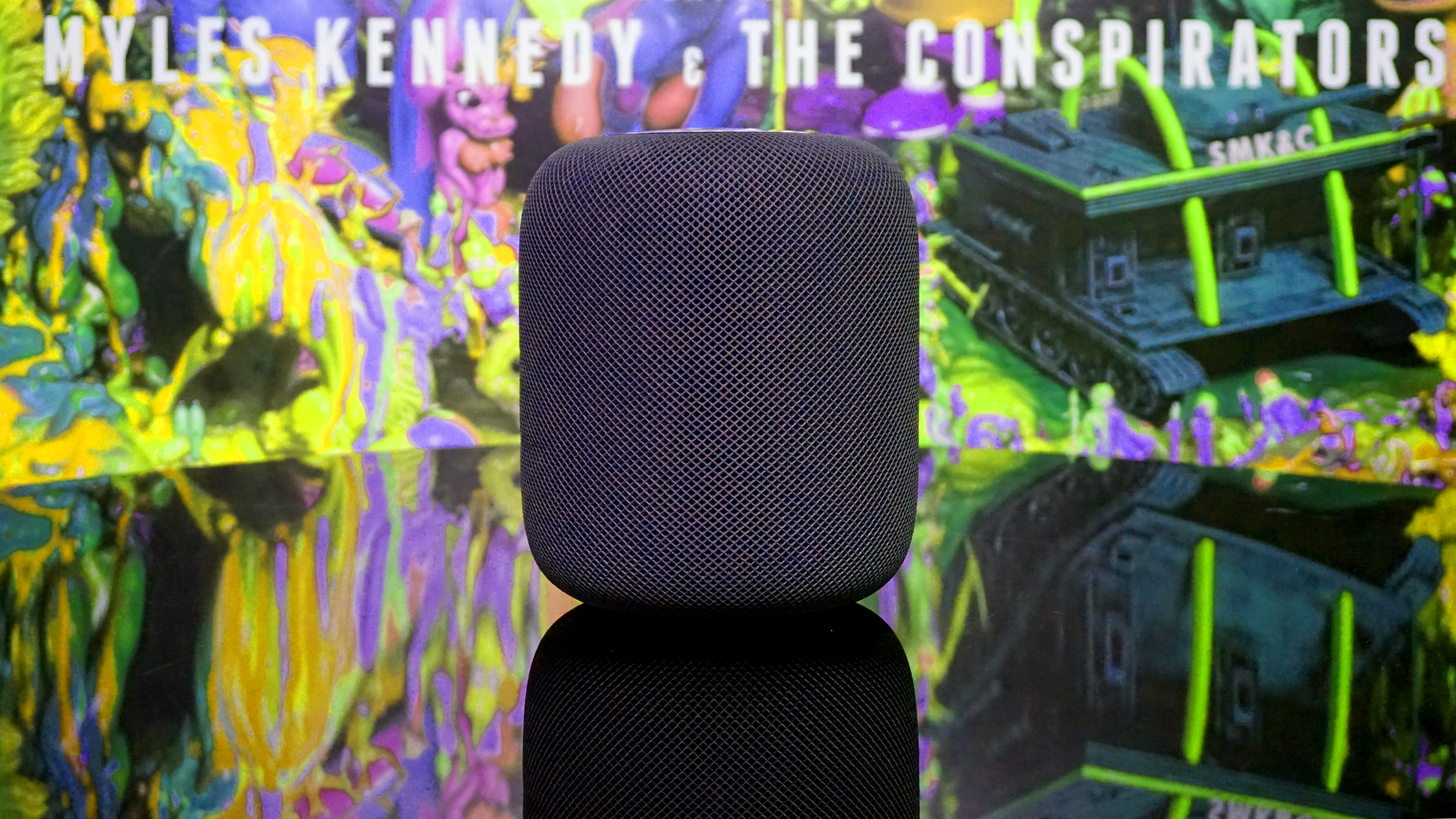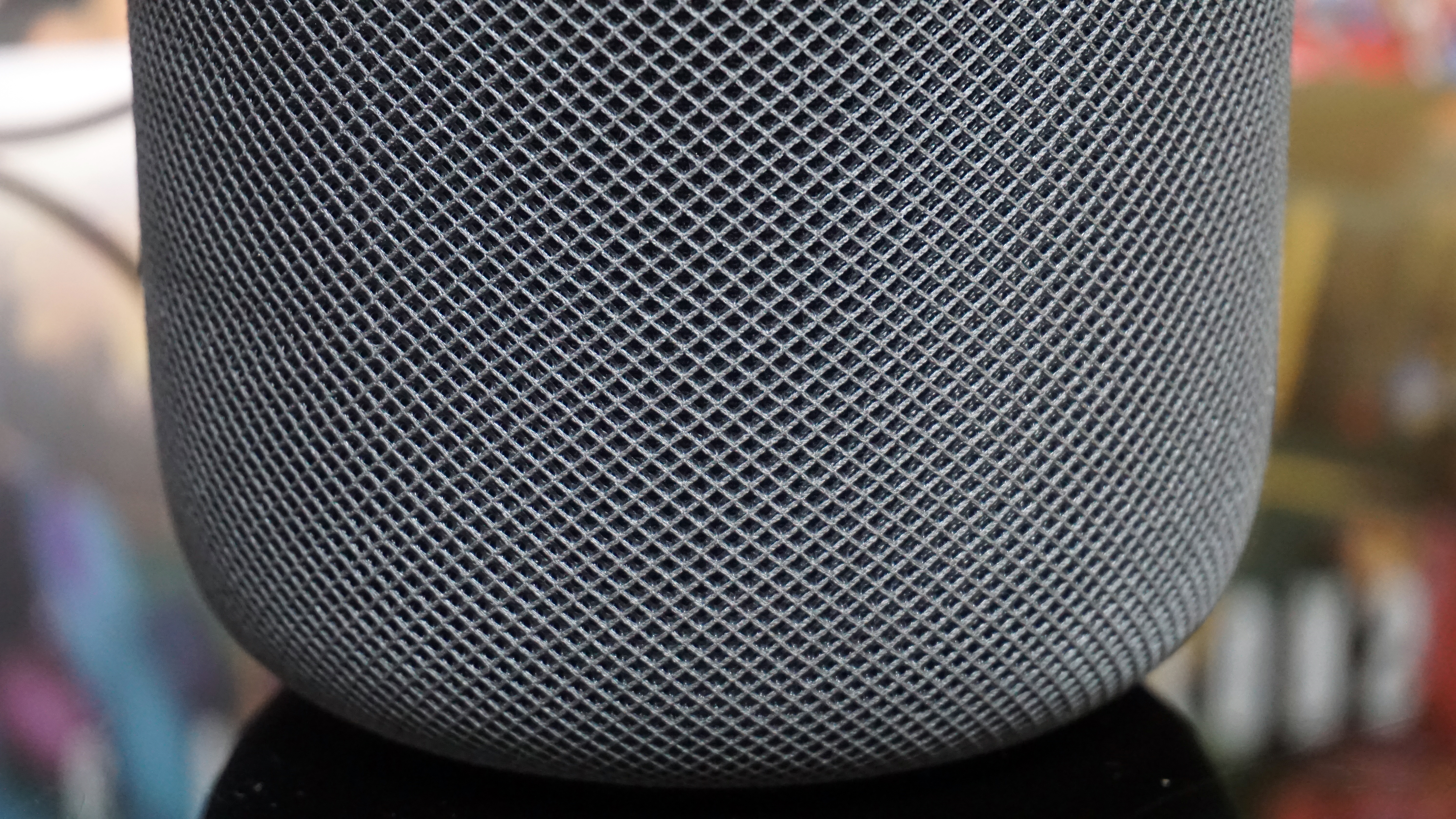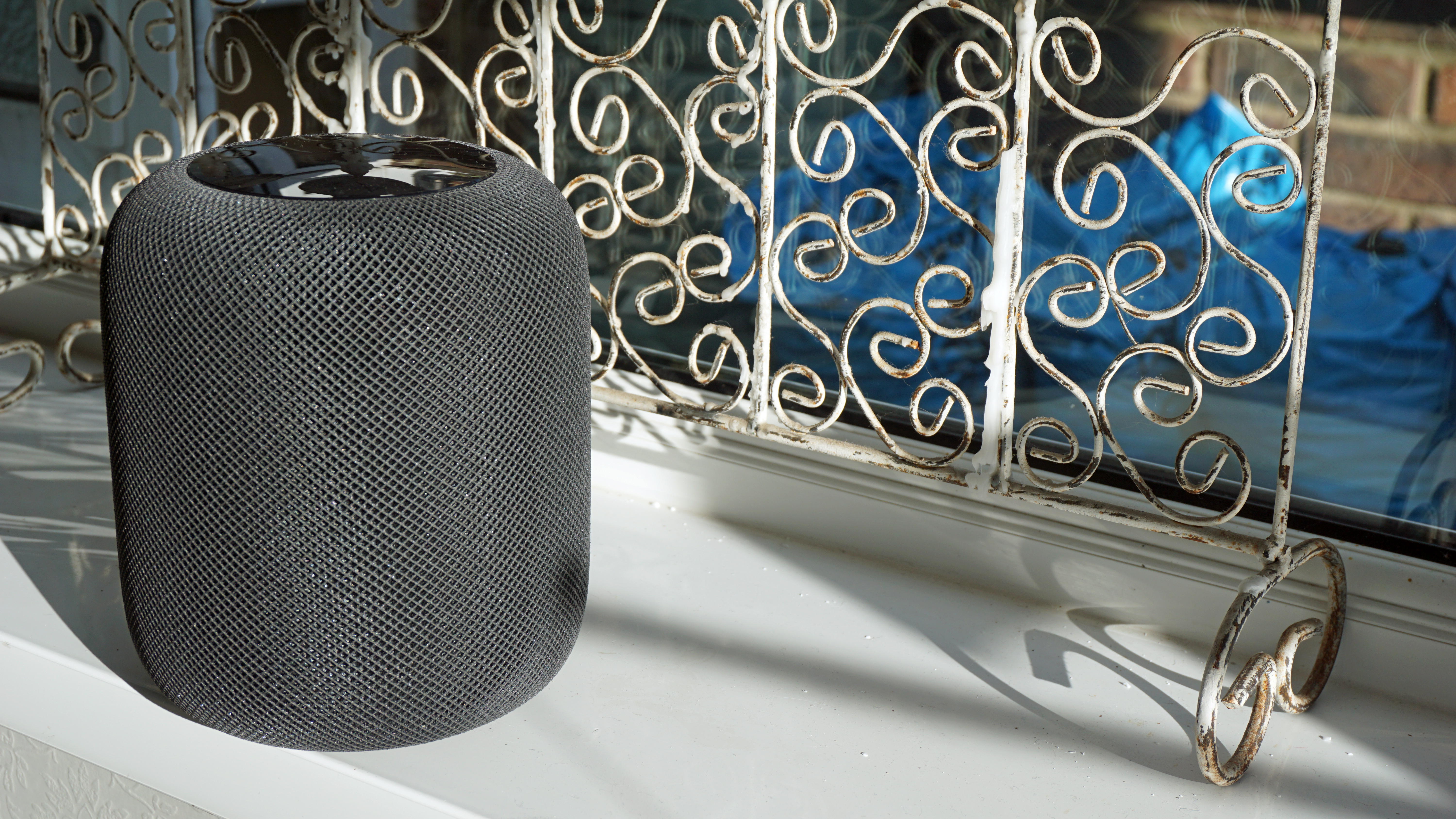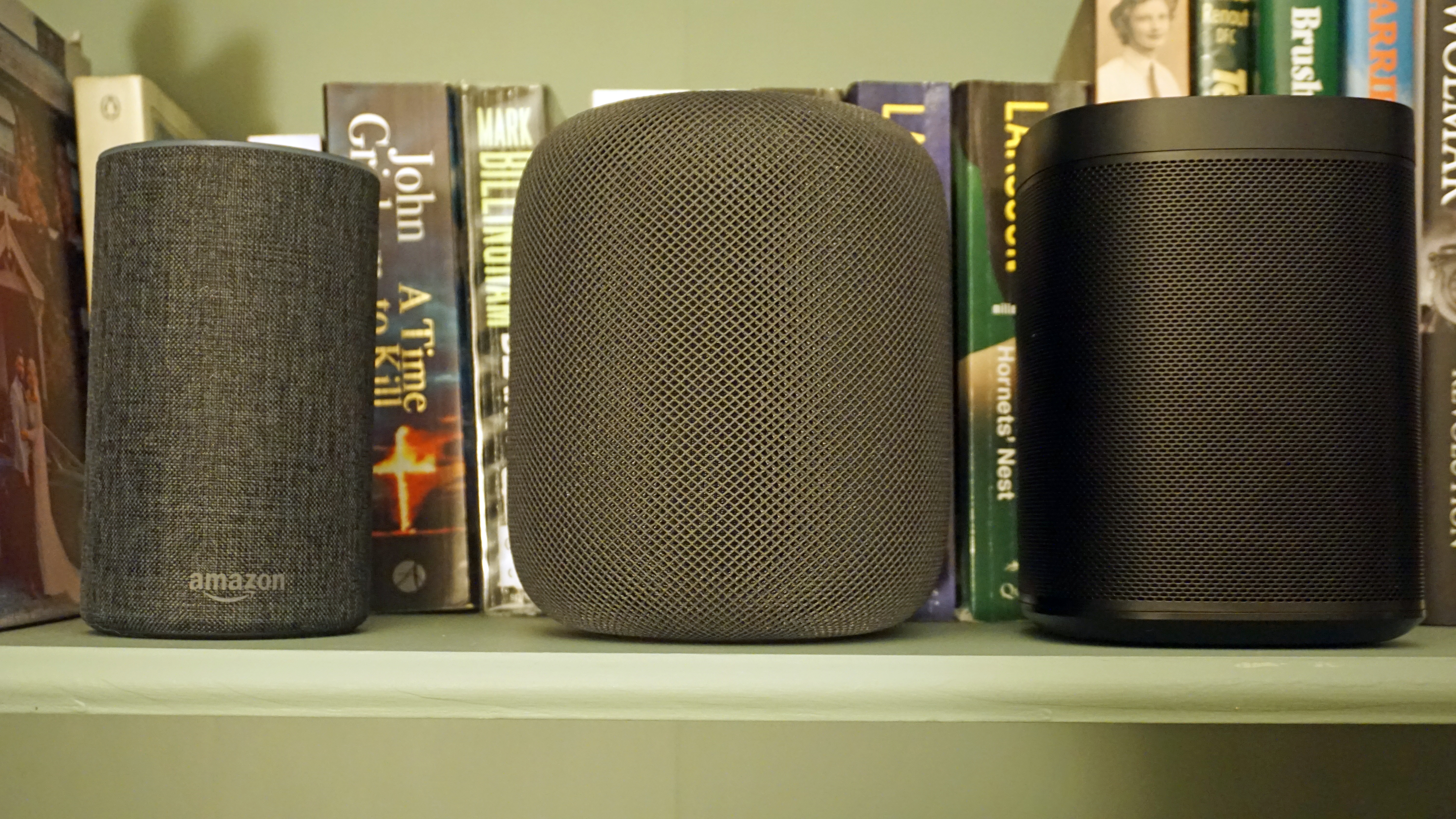Why you can trust TechRadar

Siri and the smart home
- Siri very capable at hearing your words
- Needs to be able to do more
The Apple HomePod isn't just a speaker, despite the company telling the world that this is a music-first proposition.
The feature that's going to see you using this thing regularly is the 'Hey Siri' functionality that's baked in, meaning that you're able to speak to the HomePod to ask all manner of things.
In fact, this speaker is designed to not really be touched, with interactions ideally done via voice.
With that in mind, it's a good thing that the voice recognition accuracy is incredible. Even if you're lying with your back turned to the speaker, or in another room, saying (not shouting) 'Hey Siri, turn up the volume' will be recognized nearly every time.

Even through loud music your voice can be picked up, which seems impossible and shows that those six microphones are really doing their job.
As we've said, though, you'll soon tire of having to say 'Hey Siri' over and over again, especially when skipping through tracks. Also, if you've got any other Apple device in the room that will light up in anticipation too, before realizing that it's not wanted and slinking away.
That's not a major issue, but it's not going to help your iPhone battery, for instance.
Siri does speak very normally though, answering your commands and questions naturally. In fact, the way you can speak to the HomePod is awesome, with natural language recognized in every situation.
For instance, when the alarm is going you can say 'Hey Siri, thanks!' and she / he will respond with 'I live to serve!', which is a nice touch.

For day-to-day interactions, Siri is great and rather intuitive. The natural language means there's very little barrier to getting comfortable with speaking to your HomePod, so you can say 'Hey Siri, shuffle my Just Songs playlist' and it'll know what you mean.
You can add tracks, skip forward or back or even rewind a few seconds just by asking it, and that will work flawlessly.
This doesn't just extend to music either – you can say 'Hey Siri, play the latest episode of the Football Ramble podcast' and Siri will search the catalogue and oblige.
We did note that when using two speakers, controlling the volume of them both was very hit-and-miss. Sometimes the volume would alter on one, or both, or neither it seemed. This was most annoying when you play music late at night and the volume was a bit loud, and saying 'Hey Siri, volume 10% everywhere' didn't seem to have the right effect.
One of the things Apple is pushing hard is the ability of the HomePod to help you discover the music you like, for it to get smarter over time.
Asking it to do that did yield new tunes that we enjoyed, although they were songs from artists we already had in our library.
There are still some gremlins in the discovery engine that we imagine will take a few weeks of music playback to iron out. Things like asking Siri to 'play some wake up music' in the morning and it spitting out country sounds – it's energetic, yes, but nowhere in our thousands-strong music catalogue is there any such music... even telling Siri we didn't like it didn't change the genre.
Another thing we noted in our time testing the speaker: we wish we could change 'Hey Siri' to something else. We actually called her 'Sizzle' one day in a low, low moment.
Apple recently announced a HomePod update, adding a way to search for lyrics, additional Siri languages (Spanish and Canadian French) and a feature that allows you to set timers. You can also now make calls directly from the HomePod.

Apple HomePod and HomeKit
Siri's capability isn't just to respond to your words – it's also the conduit to controlling your smart home.
That begins within the speaker, and as an alarm clock the HomePod also needs some work, as it's only got a single tone to rouse you with, and you can't ask Siri to play the news instead. You can ask it to play the news when you wake, and after a while it will save your preferred station too.
There are some kinks here – when we first asked for sports news it started playing just that, but from the day before. Sure, these are mostly just little kinks in the system, but for the money we'd expect the experience to be flawless from the off.
And that's kind of the way this speaker feels – still in beta mode, even months after launch. Without the ability to connect to other services, you wonder if the Apple stable is enough. Yes, you can create to-do lists, play music, set a timer etc... but, as another example, you can only set one timer, and a lot of people like to have multiple options when cooking. The good news is that an update is coming to remedy this, one that will let you set multiple timers via the HomePod. It's long overdue.
Apple's smart home ecosystem is called HomeKit (if you've not heard of it yet) and controlled primarily through the Home app on your iPhone, iPad or Apple Watch generally.
Setting up something like a smart plug or smart light is as simple as scanning the code on the device from your phone or tablet and having it added into the mix - once that's done, you're able to control it with your voice.
It's brilliant to be able to walk through the door, say 'Hey Siri, I'm home!' and all the lights you've set up blink up because your lamps have smart plugs.
Or saying 'Hey Siri, goodnight!' and having the lights fade out and the TV turn off - and the curtains shut if you've inexplicably already decided smart blinds are a good idea.
Less nice is the fact that you can't turn the voice off, nor change the volume. So walking in late at night and saying 'Hey Siri, turn on the lights' will still result in the voice blaring back at the same volume as in daytime: 'Okay, that's done!'
Or, while it's nice to have bedtime automated, Siri still enthusiastically, and loudly, responds when you say 'Goodnight!', which isn't ideal when half the house is asleep.
There's also still a real lag on some connections with items of HomeKit, with things like lamps showing as 'updating' on the iPhone app and uncommunicative for the HomePod.
Or, if you've got an automation set, often it'll take a while to connect to all the devices, with a 'Hmmmmm, not all your devices are responding' message popping up before all the lights going out a few seconds later. Nothing major, but more friction than expected.
Also, if there was a HomePod App Store for adding functionality, in the same way Alexa has skills, this would be an even more brilliant speaker.
The HomePod operates so much slicker than the Alexa speakers we've tried, and with the minimum of fuss, but people might want other news sources, other connections, and other streaming services to play over their expensive speaker.
But then again, such limitations have been a hallmark of Apple's walled-garden approach, and it has – time and again – proved people will buy such things, further embedding themselves into its ecosystem.
Apple HomePod final verdict
Once again, we come to the familiar question with Apple: is it worth spending your money on this product, or are you better off doing so on one that’s cheaper and does a lot of the same things, albeit without, perhaps, the same level of polish?
The Apple HomePod is a great speaker. It delivers rich, clear sound that will impress anyone who listens to it, and every facet of the way it’s designed and delivers audio has been well thought through.
There are other speakers that can do more – basically anything that has Alexa inside, as there are more smart home-enabled devices that are compatible with Amazon's standard – and there are cheaper speakers that still sound pretty good.

However, the HomePod sounds brilliant and offers some smart Siri functionality... as long as you’re deeply embedded in the Apple ecosystem.
The question we kept asking ourselves, then, is: would we rather have one HomePod, with superior sounds, two Sonos One speakers with good sound plus Alexa / Spotify (and Google Assistant at some point too), or five Amazon Echo devices, offering poorer audio quality but a fully integrated smart home experience?
It’s a tough one, and it depends on how much you want a speaker that seamlessly fits into your Apple life. If you’ve got a MacBook, iPhone, Apple Watch, iPad and Apple TV (and still have any money left at the end of that spending spree), then you’ll find the HomePod is a nice addition to your life.
But there are still a few little bumps in there that remove some of the gloss – Siri not being able to search the web, a lack of Bluetooth streaming, or being able to control your Apple TV or iPhone directly from the speaker are omissions that many would like to have.
In effect, the HomePod feels very beta. We want Siri to be far more capable (a HomePod App Store would be a really useful addition) and for HomeKit to be a bit more robust – we'd also hoped for more on the stereo capabilities too. At this stage, if you're buying more than one, you're really better off putting them in different rooms in the house than trying to combine them together.
If you only want a great-sounding smart speaker and aren’t fussed about the exclusive aspects of Siri’s functionality then you’ll enjoy the HomePod a lot.
But if you’re a little thriftier, and aren’t exclusively wedded to Apple products, then it's worth holding off and seeing how the smart speaker market shakes out before making a purchasing decision.
- First reviewed February 2018

Gareth has been part of the consumer technology world in a career spanning three decades. He started life as a staff writer on the fledgling TechRadar, and has grew with the site (primarily as phones, tablets and wearables editor) until becoming Global Editor in Chief in 2018. Gareth has written over 4,000 articles for TechRadar, has contributed expert insight to a number of other publications, chaired panels on zeitgeist technologies, presented at the Gadget Show Live as well as representing the brand on TV and radio for multiple channels including Sky, BBC, ITV and Al-Jazeera. Passionate about fitness, he can bore anyone rigid about stress management, sleep tracking, heart rate variance as well as bemoaning something about the latest iPhone, Galaxy or OLED TV.
